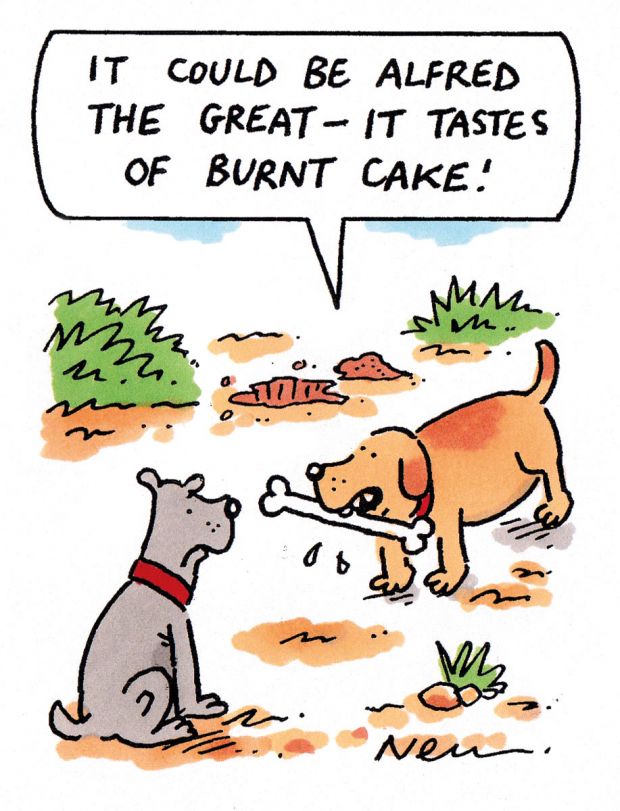
- After the University of Leicester’s Richard III jamboree last year, the University of Winchester has apparently gone one better by finding Alfred the Great. Well, a small fragment of his pelvis at least, the Daily Mail reported on 17 January. Thanks to dogged work by human osteology researcher Katie Tucker, an unpromising chunk of bone excavated from the grounds of Hyde Abbey in Winchester in 1999, and left in a box in the city’s museum, has now been identified as belonging to the Anglo-Saxon ruler, who died in 899, or to his son, Edward the Elder. “It overshadows the discovery of Richard III’s remains,” said television historian Neil Oliver pointedly, adding that Alfred is a “mythologised figure, almost like Arthur”.
- Vice-chancellors in the UK often look enviously across the pond at the pay awarded to their US peers. But they might be less enamoured with the conditions foisted on Gwendolyn Boyd when she became the first female president of Alabama State University. According to The Times on 14 January, Dr Boyd’s contract stipulates “she shall not be allowed to cohabitate in the president’s residence with any person with whom she has a romantic relation”. The rule will remain in place “for as long as Dr Boyd is president and a single person”. Dr Boyd said she is happy to accept the somewhat puritan terms of office, but others are less happy about the intrusion into her privacy. “This woman is not a criminal, she’s not a prisoner,” said contract lawyer Raymond Cotton, who believes the veto on personal relations by Alabama may be unconstitutional.
- Students at University College, Oxford who performed poorly in their exams have complained they were “publicly humiliated” after their names and results were emailed to their peers, The Times reported on 15 January. The list of the 50 or so worst-performing students – those achieving a 2:2 grade or lower in their pre-Christmas exams – was mistakenly sent to hundreds of students, the paper said. “I was pretty gutted after my results last term, but didn’t realise I would be publicly humiliated,” one student said. It seems the days when students laughed off a “Desmond” (2:2) or a “Thora” (a third) are well and truly gone.
- Student leaders have criticised the University of Cambridge for handing a fee discount to Prince William, the Sunday Mirror reported on 19 January. The Duke of Cambridge is paying about £10,000 for a 10-week course in agricultural management, but “sources” say it would usually cost far more because it has been organised especially for him, the paper said. “It’s not as though the Queen has had to remortgage Buckingham Palace to help him through university,” said Dom Anderson, vice-president of the National Union of Students, who said there were “more deserving postgraduate students in Cambridge than the heir to the British throne”. The university and Kensington Palace refused to comment on any fee discount, but the Prince will surely pass on his appreciation for the waiver when he next arrives for class, perhaps in his newly acquired £250,000 Bentley.
- Popular science writer Lewis Wolpert has apologised for accidentally lifting large sections of other people’s work without citing the sources, The Observer reported on 19 January. The eminent developmental biologist, who is in his mid-eighties, said he had inadvertently included direct passages from academic papers, websites and Wikipedia in his 2011 book, You’re Looking Very Well, having downloaded them for research purposes, but then failed to recognise them as other people’s work. The “lack of attribution” was “due to carelessness on my part”, said Professor Wolpert, whose publisher Faber and Faber declined to comment on whether his age had contributed to the error. Ironically, one of Wolpert’s uncredited passages sums up rather well his current predicament: “Elderly people…today are not treated to the respect and reverence to which they were accustomed earlier in history,” he (or should that be US psychology professor Alan Pope?) wrote.
Register to continue
Why register?
- Registration is free and only takes a moment
- Once registered, you can read 3 articles a month
- Sign up for our newsletter
Subscribe
Or subscribe for unlimited access to:
- Unlimited access to news, views, insights & reviews
- Digital editions
- Digital access to THE’s university and college rankings analysis
Already registered or a current subscriber?
Please or to read this article.
